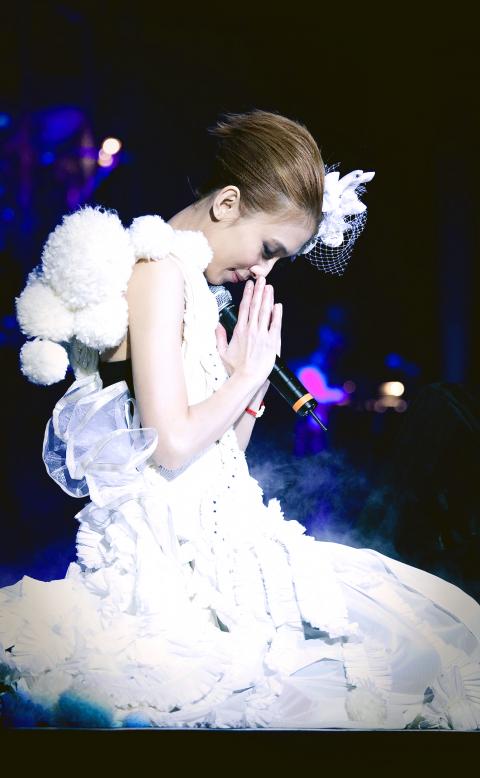Mando-pop siren Penny Tai (戴佩妮) intends to reinvigorate her career tonight with an unplugged concert titled Singing at Home (在家裡唱歌) at Legacy Taipei. And as the show has already sold out, the future looks bright for the Malaysian-born starlet.
Tai is no stranger to starting anew. Right after performing a new song during her Who Exactly Am I (我到底是誰) concert in 2008, Tai cut her long mane off on stage in front of a 2,000-strong audience before announcing, “today is the last day of the first half of my life.”
“That was my good-bye because I was a person who dwelt on the past. I was pessimistic,” Tai said during a telephone interview on Monday. “I want to live in the moment.”

PHOTO COURTESY OF ENJOY MUSIC
One of Mando-pop’s most acclaimed singer/songwriters, Tai is known for her rock-infused pop and won a Golden Melody Award for Best Composer for her song Crazy in Love (愛瘋了) in 2006.
“My songs were mostly biographical,” Tai said. “These days, if I need to write a love song, I will write about other people’s experiences.”
Tai took a break from her career to form a band, D-Power, in 2007 and ventured into digital singles (with eight releases to date) in 2008.
Lacking a marketing budget, she took up photography to produce her own publicity material.
From photography she went on to direct music videos, and made her directorial debut with Jody Chiang’s (江蕙) hit single Ga Li Lum Diao Diao (甲你攬牢牢) in 2008, and received two Golden Melody Award nominations last year for best video direction for the music videos to label mate A-bin’s (方炯鑌) Wind (風) and for R ’n’ B crooner Khalil Fong’s (方大同) Black and White (黑白).
Tai is also a professional dancer with 11 years of training.
“If I am not a pop star, I could be a mother, a teacher or a MV director too,” the multitalented artist said.
On the Net: www.iampenny.idv.tw

May 18 to May 24 Pastor Yang Hsu’s (楊煦) congregation was shocked upon seeing the land he chose to build his orphanage. It was surrounded by mountains on three sides, and the only way to access it was to cross a river by foot. The soil was poor due to runoff, and large rocks strewn across the plot prevented much from growing. In addition, there was no running water or electricity. But it was all Yang could afford. He and his Indigenous Atayal wife Lin Feng-ying (林鳳英) had already been caring for 24 orphans in their home, and they were in

On May 2, Chinese Nationalist Party (KMT) Chairman Eric Chu (朱立倫), at a meeting in support of Taipei city councilors at party headquarters, compared President William Lai (賴清德) to Hitler. Chu claimed that unlike any other democracy worldwide in history, no other leader was rooting out opposing parties like Lai and the Democratic Progressive Party (DPP). That his statements are wildly inaccurate was not the point. It was a rallying cry, not a history lesson. This was intentional to provoke the international diplomatic community into a response, which was promptly provided. Both the German and Israeli offices issued statements on Facebook

Even by the standards of Ukraine’s International Legion, which comprises volunteers from over 55 countries, Han has an unusual backstory. Born in Taichung, he grew up in Costa Rica — then one of Taiwan’s diplomatic allies — where a relative worked for the embassy. After attending an American international high school in San Jose, Costa Rica’s capital, Han — who prefers to use only his given name for OPSEC (operations security) reasons — moved to the US in his teens. He attended Penn State University before returning to Taiwan to work in the semiconductor industry in Kaohsiung, where he

Australia’s ABC last week published a piece on the recall campaign. The article emphasized the divisions in Taiwanese society and blamed the recall for worsening them. It quotes a supporter of the Taiwan People’s Party (TPP) as saying “I’m 43 years old, born and raised here, and I’ve never seen the country this divided in my entire life.” Apparently, as an adult, she slept through the post-election violence in 2000 and 2004 by the Chinese Nationalist Party (KMT), the veiled coup threats by the military when Chen Shui-bian (陳水扁) became president, the 2006 Red Shirt protests against him ginned up by